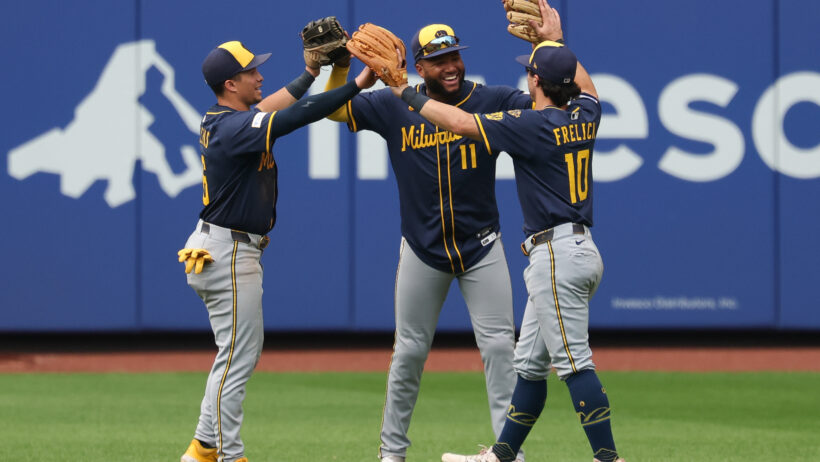Veteran Handicapper Anthony Best Details Scams and a Changing Betting Industry
By Aaron Gray
Updated:

We recently had a chance to speak with Anthony Best, a veteran sports handicapper, and partner at Master Strategy Investments. A few minutes into our conversation with Best (who goes by a pseudonym, for discretion and privacy) we quickly realized he’s an archetypal example of someone who’s been taking sportsbooks to the cleaners since Vegas was raised from the desert. He’s definitely a lot more of the Casino era than he is of the Two for the Money era, and he’s seen the handicapping industry grow and evolve from its relative youth to its current incarnation.
Best has seen a lot during his tenure as a sharp. He’s watched from the front lines as Jimmy the Greek brought sports betting into the mainstream on CBS (and in fact, Best’s father knew Jimmy, when Jimmy famously duked conductors and rummaged through locomotive cars and trains gathering inside information and insights on players and teams from the local newspapers); he’s worked with the legendary, but fellow recluse, Billy Walters (as the two are pictured, together, on the MSI website); and he’s seen how burgeoning Instagram scamdicappers who “can’t pick their nose” came to dominate the handicapping industry.


Anthony Best is equal parts intellect and bravado, meshed with a brash old-school temperament, and his sports-prediction acumen is obvious.
Best sits on the opposite end of the spectrum to someone who handicaps Sunday’s game from his couch. He’s as dedicated to his craft as any successful professional mutual fund or hedge fund manager, and he’s equally comfortable extolling the virtues of Warren Buffet as he is speaking to the underlying metrics that go into the spread.
We got a chance to speak with him about new media’s role in sports handicapping, why he prefers the term “investing” to “betting,” and the oldest scams in the industry, among many other topics. Here’s what he had to say.
The following Q&A is based on an SBD phone interview and has been edited for both length and clarity.
So, how did you get started as a sports handicapper?
Well, I’ve always been pretty intrigued by the worlds of gambling, chance, and betting, even from a young age. I used to make my own parlay cards and distribute them to my family members and classmates when I was eight years old. It wasn’t long after that that I built a casino in my basement.
Of course, I was always interested in sports too, and I played them all my life. I was a 3-sport varsity athlete and in college played for a defending National Championship football team.
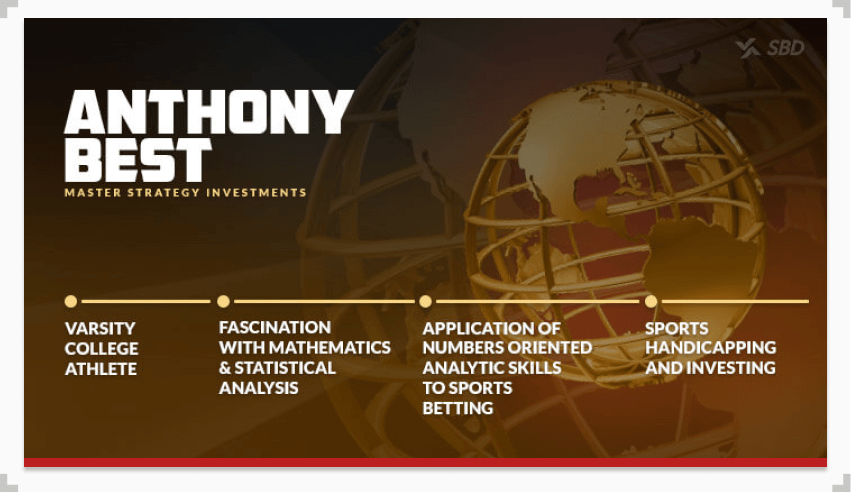

I was always an athlete with a brain though, and I appreciated mathematics, statistics, strategy, and all the things beyond just the physical aspects of the sports I played.
When I stopped playing sports, sports handicapping was a natural fit for me. It works for a lot of former athletes, primarily because sports handicapping offers the competition of games in the way that other professions don’t.
What’s your general opinion of your peers in the handicapping industry?
Well, there’s really three types of handicappers.
The first kind is people, professionals, who really know what they’re doing. They really know the ins and outs of how to handicap, how to work the numbers with the other aspects of the game. These are the guys, who, after the linesmakers overseas open a number and then Vegas opens a number, allow us to “bet into it.” We use our formulas, to either confirm or refute their statistical opinions of a game.
In the old days, you would see the 10-20 like us lined-up outside the Stardust Hotel, right after the Sunday NFL games or sometimes at 6:00 AM, waiting to see the posted spreads come out. Then we were there in the days when Al, and then his son Dana, ran Don Best Sports and they would transmit the overseas or Vegas openers around the world.
In the old days, you would see the 10-20 like us lined-up outside the Stardust Hotel, right after the Sunday NFL games or sometimes at 6:00 AM, waiting to see the posted spreads come out.
Those are the kind of people who you first saw on TV. The people like Jimmy the Greek. See, Jimmy was the real deal, for the most part. He was an actual professional handicapper. However, sports betting, then, was less about analytics and data. The books were able to be beaten by those who just had more base knowledge like Jimmy the Greek. However, the less time you study and the more you invest your time and energy into other things, the less effective you become. But, to his credit, he became much more iconic than almost all of his peers.
Lastly, there’s the type of people who operate today. The people who can’t even pick their nose. They don’t know the first thing about who to bet on, what they’re betting on, or even where to bet. This type makes up most of the new age types you see on social media. In fact, whether it’s TV or elsewhere, I call them “the moronic media.” These are the guys who get a fat paycheck for habitually picking losers. They are typically former sports writers or reporters, most who have never played the game who have nothing more than a loud mouth and an opinion.
These guys have no risk. They get paid no matter who they pick. It’s really upsetting and offensive to those of us who have to win to make a living.
However, I do give them some credit, for being where they are; and in fact, these are the guys we pros are actually playing against. It’s the media that drives public opinion, and it’s both of them we are competing against. Them and the bookmakers.
In fact, we actually track the media’s selections so we know who not to play.
It’s changed a lot over the years. There have really been three different generations of sports handicappers. Well, really I mean the services and the business models.
What do you mean when you say three generations of sports handicappers?
Well, the first generation was the teachers. The guys who knew something about betting sports. They succeeded because the public, people, wanted to learn about it. Their model was to teach people about handicapping; to teach them how to pick winners. Then they would leave it up to the public to make their own plays.
However, that model didn’t last because the teachers weren’t that intelligent and there is a lot more to winning than picking winners. You have to manage your money and also know where to get a bet down. Besides, you can’t expect the students to be smarter than the teachers and it’s just the nature of people to devote their knowledge, time and energy to something other learning. People want everything quick and easy, they want someone else to do the work.
People want everything quick and easy, they want someone else to do the work.
The second generation is the guys who give out selections. These guys are less about picking winners than they are about getting new customers. They at least figured out that the public didn’t want to learn how to do something, they just wanted the winners. You know, “You do it for me and tell me what to do?” The downside is that the selection services still had to pick more winners than losers and the public had to know what to do with the team. As in, what kind of a b-e-t to make and where to make it?
I consider Master Strategy Investments and people like myself to be part of the third generation. It’s a more advanced vision for sports handicapping, where we focus on making money and remove the investor from the entire process of investing on a player, team, or even horse. People want in on sports betting action more than ever, but they’re to the point where they don’t want to learn how to do it, or even have to be told a selection. They’d rather just be told how much money they made.
It isn’t really much different than investing in a stock, or fund, and watching your portfolio grow.
I know what you mean. Tell me more about the handicappers who’re purposefully ripping people off. Is that a well-known scam, where they divide picks between their client base?
It’s one of the oldest scams in the handicapping industry. It’s really taken off with social media, but its origins go back a lot further than that.
It used to be that handicapping services would advertise their services in the major papers on both coasts. They’d usually pick the big football games. They’d give half the people one team, and half the other. It’s all a part of a big Ponzi Scheme.
You consider it a Ponzi Scheme?
I do. I mean, it’s a little different than a traditional Ponzi scheme where first investors get money from later investors, but it’s a similar principle. Two types of handicappers wind up using some type of Ponzi scheme, those who start out actually trying to scam people, and those people who start out legitimate and end up scammers because they fail to pick winners or invest wisely consistently. They fail at making money for their clients while still taking a modest percentage for their work and service. As such, they always need new clients.
Two types of handicappers wind up using some type of Ponzi scheme, those who start out actually trying to scam people, and those people who start out legitimate and end up scammers.
I touched on one classic version of a sports handicapping scam above. Half the people get winners and half the people get losers. This is a classic scam in the industry. They’ll keep doing this until it becomes untenable, or people get wise to what they’re doing. They follow-up on the ads where they gave the winners and say, “See, we picked the winner.” And when they pick a loser, they ghost you.
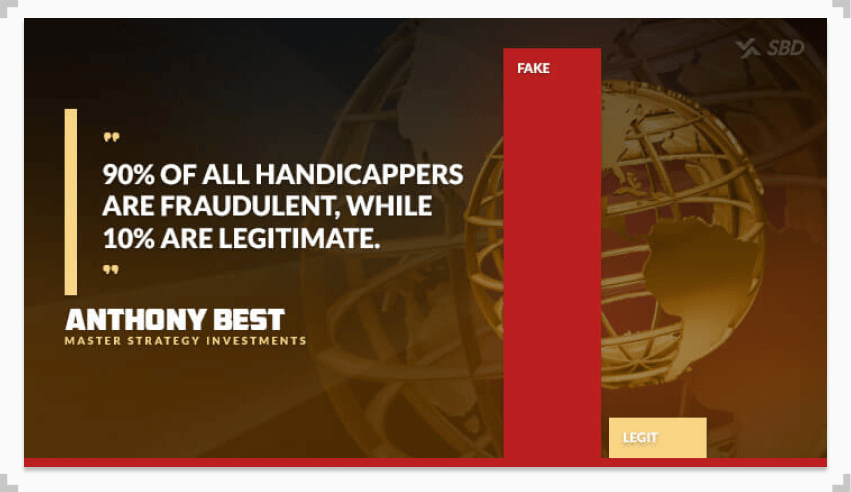

The other side is people who start out trying to offer real services, they try to make good picks for their clients, but they end up losing a lot themselves. Their bankroll starts to evaporate. As a result, they end up needing to take a bigger and bigger cut to remain profitable, because they’re picking more losers than anything else. Their job starts out as picking the winners, but then it becomes needing to draw in more and more people so that they can stay afloat. Of course, it all stems from not being able to pick winners with any regularity.
Don’t think this is just limited to nobodies on social media, either. This includes a lot of different sports handicapping personalities that you can catch on television too, guys who get paid millions of dollars to just have the wrong opinions. I mean, like I said, earlier, we track who the moronic media picks so we know which way the line will move and who the public will play. I mean, we have records on how bad virtually every guy on ESPN is, especially guys like Steven A. Smith or Charles Barkley.
I mean, I like Charles, because he says “Only God’s an expert,” but these two guys are terrible!
What types of handicapping services do you think appeal to the majority of bettors? Ones like MSI, or the new media types that are run on social media platforms?
Look, everyone who bets on sports is doing so for one of the following reasons, or some combination of them. The first is money. People want to make money.
The second is action. People want to feel the highs of winning and overcome the lows of losing.
The third is affiliation. This is probably the most important. Everyone wants to feel like they’re part of something, whether that’s their hometown team or an allegiance to a certain service or personality.
On that note, who do you see as your core audience?
People who are ahead of the curve. People, players, with vision. Players who can see and prayerfully predict the future of teaming with us. Players who want to profit!
Think about it: There are only two types of people out there; two types of players: Winners or Losers.
Do you think using social media is important?
Yes and no. There is a clear hierarchy. To me, it all begins with television. Seeing something on TV drives people to the Internet. That’s why, when Billy Walters did 60 Minutes, we knew we had something. His segment, which you can see on our website, is and was our idea for a reality show, The Gambler. To us, that’s the big winner: having a reality show. I mean, getting on the news is always good since it’s really just free advertising, but a reality show, that’s like an infomercial!
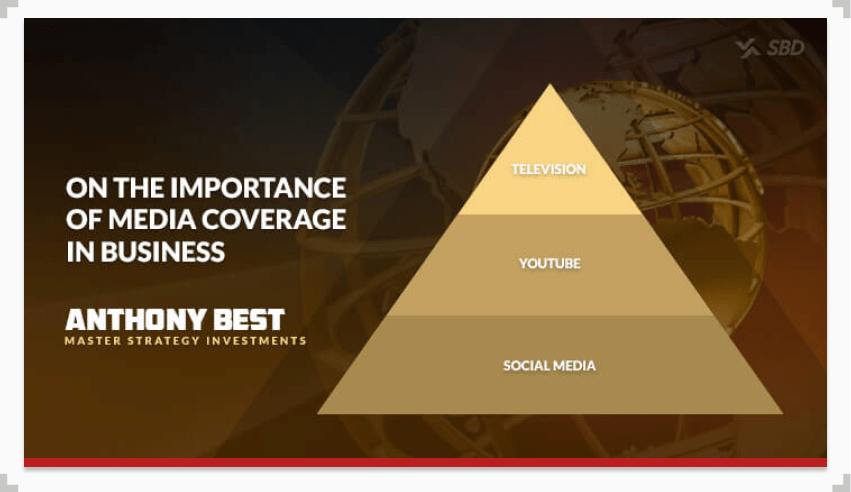
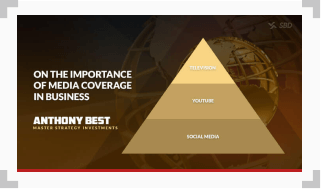
See, let me tell you something. Real pro’s, 90% of the time, don’t own or offer a service. They just win. Billy and I, we want to be left alone. We may not necessarily need the money. But at some point, as was Billy’s case; he wanted to speak out against Wall Street and deep down, after you’ve made a bunch of money, and own a 20 million dollar jet, you want people to know you’re good at what you do.
As for me, I don’t want to be totally reclusive any more, I want to be on TV and tell the truth on who’s going to win and why. I want to tell people how sports investing works, and I want to see myself and my clients make money vs. those people who have been on TV for decades making ungodly amounts of money for being unknowledgeable, inaccurate or wrong.
Tell a little bit about what Master Strategy Investments is and how it goes against convention in the sports handicapping world.
Well, first things first, I prefer to think of sports handicapping as “investing.” I don’t like to use either the B-word [betting] or the G-word [gambling]. Everything we try to do is wise and businesslike. Gambler’s gamble, lose, and lose money. Investors invest, win, and make money.
Master Strategy Investments isn’t a traditional handicapping operation, as we don’t typically dispense picks to our clients. Instead, we do what’s called “entity wagering,” which was legal even before the Supreme Court overturned the federal ban on sports betting and ruled against PASPA. We act as a broker more than anything else.
Essentially, entity wagering is when money is invested in an entity for wagering purposes, but that money is managed completely independently. The client has no influence on what wagers he or she chooses, and under no circumstances do we ever bet under the direction or influence of any parties outside of Nevada.
Our clients (shareholders) purchase shares, which give them access to our one fund that we manage for all of our clients. When we see plays we like, we invest at a Nevada sportsbook. Clients are informed of the play, by email, as immediately as we can after the game or event starts. We also inform them of the strength of the play. We want people to know who to root for.
Value of shares increase incrementally, and then according to a bi-weekly/monthly/quarterly schedule, you’re able to either request a withdrawal or continue to invest. We only take 10%, for our company. The same percentage you pay the house if you lose. But unlike the sportsbook or other services; we don’t take it out if you lose; we only take out our 10% if you and the other shareholder’s win!
What spawned such a unique approach to sports handicapping, outside of the obvious legal ramifications? Why didn’t you choose to try your hand playing the stock market, or something like that, instead?
In the 60 Minutes video, you will see and hear Billy’s disdain for Wall Street and the stock market. That’s how many of us in the industry perceive the stock market.
However, from my perspective, I know sports much better than business. And, at the MIT Sloan Sports Analytics Conference, which I attend, the data shows sports outperforming almost everything else in the country, popularity wise. In fact, Las Vegas is always booming, year after year, and every single year billions of dollars flow into sportsbooks on behalf of winners and losers alike.
So, we really saw MSI as an opportunity to make money investing in sports for our teammates or clients; and also as an entertainment product; not unlike a pro sports team or broadcast. In fact, we predicted long ago, the legalization outside of Nevada. We predict handicapping services in the style of MSI will dominate the sports world in the coming years.
Want to know more about the world of professional betting or more on how contemporary betting scams work? You can brush up on the same strategies pros use in our strategy guide or check out the rest of our betting scams section.

Sports & Politics Writer
Aaron has been featured in publications such as Intelligence Magazine, The Investing News Network, Haven, Tech Bullion, and many local and national publications. He has contributed to SBD since 2017. Western B.A. '14, NYU M.A. '17.



